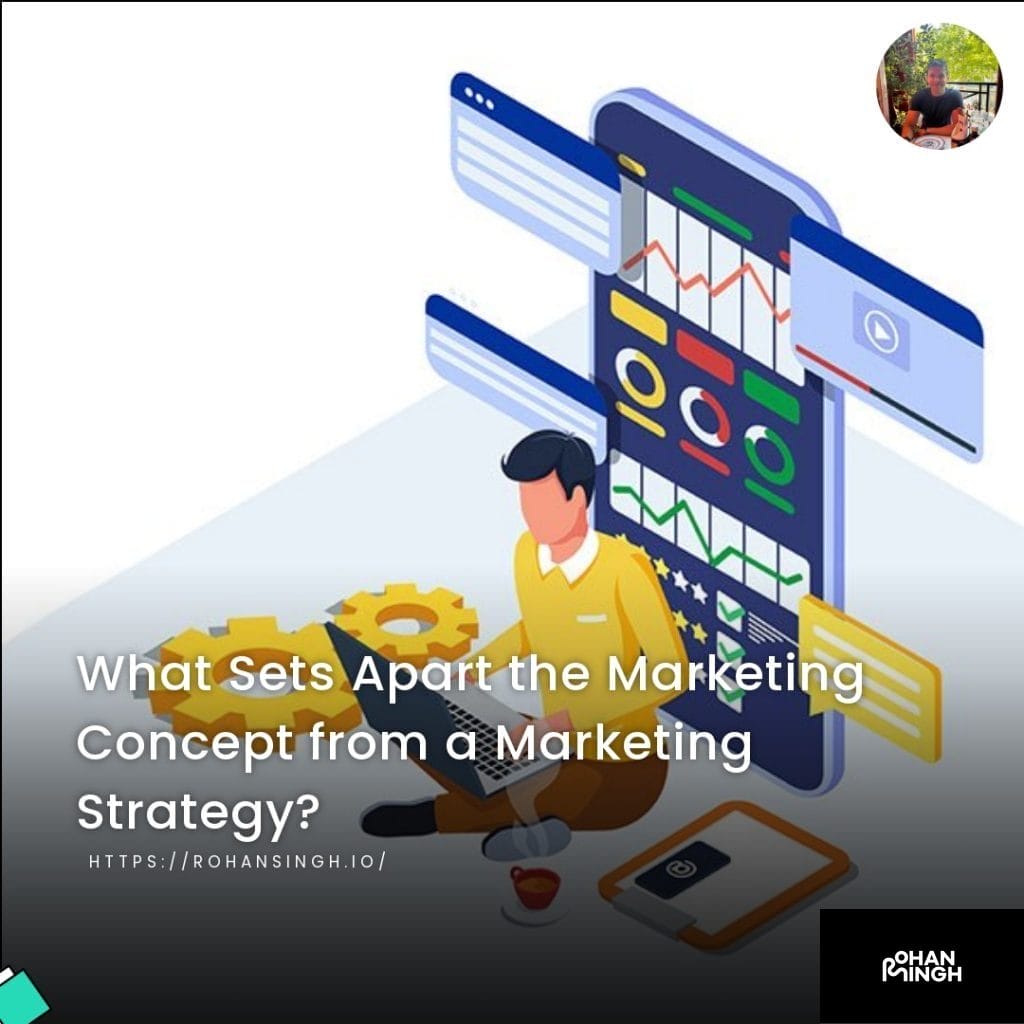What’s the Difference Between Project Management and Marketing Strategy?

What is Project Management?
Project management is a structured process that involves planning, organizing, and executing tasks to achieve specific goals within a set timeline and budget. In the context of marketing, project management refers to the management of marketing initiatives and campaigns to drive business growth. It involves coordinating and collaborating with various stakeholders, such as marketing teams, internal and external stakeholders, graphic designers, and project managers, to ensure that marketing projects are executed smoothly and efficiently.
Table of Contents
ToggleProject management in marketing is crucial for the successful implementation of strategic plans and the achievement of business objectives. It helps marketing departments to stay organized, track progress, and effectively communicate with different teams and stakeholders involved in the project. From developing a project charter and defining project goals to creating a project schedule and budget, project management provides a structured approach to handling complex marketing projects.
By utilizing project management software and tools, marketing project managers can streamline the workflow, keep track of tasks, and ensure that all project activities are aligned with the overall business strategy. This not only improves the efficiency and productivity of the marketing teams but also enhances customer satisfaction by delivering projects on time and within scope. So, whether it’s launching a new product, running a social media marketing campaign, or analyzing market opportunities, project management serves as a source of truth and a single source of collaboration for marketing teams, ensuring that projects are executed successfully from start to finish.
What is Marketing Strategy?
Marketing strategy is the roadmap that guides marketing initiatives and activities to achieve specific project objectives and goals. It is a comprehensive plan that outlines how a company will position its products or services in the market and effectively communicate its value proposition to the target audience. A well-defined marketing strategy takes into consideration market research insights and identifies the most effective channels, messages, and calls to action to reach and engage the target audience.
One of the key components of a marketing strategy is understanding the target audience. By conducting thorough market research, marketers can gather valuable insights about customer preferences, needs, and behaviors. This allows them to tailor marketing messages and develop compelling calls to action that resonate with the target audience. By understanding our target audience, we can create meaningful and impactful marketing campaigns that capture their attention and drive them to take the desired action.
In addition, marketing strategy helps align marketing efforts with the overall project objectives. It ensures that marketing initiatives are in line with the business strategy and contributes to the achievement of specific project goals. By defining clear objectives and key performance indicators, marketing strategy provides a roadmap for measuring the success of marketing efforts and optimizing future projects. By continuously analyzing and adjusting marketing strategies based on performance metrics, businesses can stay agile and responsive to market opportunities, giving them a competitive advantage.
Let's talk about your future project!
Eager to collaborate on your upcoming endeavor? Let's explore and ignite the potential of your next big idea, shaping a promising future together!
Project Management Principles
Effective project management is essential for the successful execution of marketing strategies. Project management principles provide a structured approach to planning, organizing, and controlling marketing initiatives, ensuring that they are completed on time, within budget, and with the desired outcomes. By applying project management principles, marketing teams can navigate the complexities of their projects, coordinate tasks, and collaborate effectively with both internal and external stakeholders.
One principle of project management is the establishment of a clear project scope. This involves defining the objectives, deliverables, and desired outcomes of the marketing project. By clearly defining the scope, marketers can avoid scope creep and ensure that the project stays on track. Another important principle is the development of a project timeline, outlining the key milestones and deadlines. This helps to keep everyone accountable and ensures that the project progresses according to plan.
Additionally, project management principles emphasize the importance of effective communication and collaboration. By fostering open lines of communication and encouraging collaboration among team members, marketers can streamline workflow, share information, and address any issues or obstacles that may arise during the project.
Project management tools and software also play a crucial role in executing marketing strategies. These tools provide a centralized platform for project teams to track progress, assign tasks, manage budgets, and monitor project status. They act as a single source of truth, allowing marketers to have visibility into the project’s progress and make informed decisions.
By incorporating project management principles into marketing strategies, businesses can improve efficiency, reduce risks, and deliver successful projects that align with their overall business objectives. As marketing continues to evolve and become more complex, embracing project management principles becomes even more crucial for achieving desired outcomes and staying competitive in the market.

Setting Project Goals
The first step in setting project goals is to fully understand the project scope and objectives. This involves clarifying the desired outcomes and deliverables of the marketing project. By clearly defining the scope, marketers can establish a clear direction for the project and ensure that it aligns with the overall marketing strategy. This understanding serves as the foundation for setting achievable and realistic goals.
Once the project scope and objectives are clear, the next step is to identify the specific tasks and resources required for project completion. This involves breaking down the project into smaller, manageable tasks and determining the necessary resources, such as marketing tools or team members, to carry out these tasks. Estimating the level of effort needed for each task is crucial in defining milestones and deadlines. By understanding the required level of effort for each task, marketers can set realistic deadlines and create a timeline that reflects the project’s unique requirements.
Setting project goals is essential for driving the marketing project forward and ensuring its successful completion. It provides a clear focus for the marketing team and helps them stay on track throughout the project. By understanding the project scope, identifying tasks and resources, and estimating the level of effort required, marketers can set goals that are measurable, achievable, and aligned with their overall marketing strategy.
Creating a Project Charter
When embarking on a marketing project, it is essential to have a clear roadmap that outlines the scope, objectives, and stakeholders involved. This is where a project charter comes into play. Acting as a foundation for the project, a project charter is a vital document that helps set the direction and expectations for the entire marketing strategy.
The purpose of a project charter is to articulate the project’s vision and objectives, providing a clear understanding of what needs to be achieved. It serves as a guiding document that helps align all team members and stakeholders toward a common goal. By clearly defining the project’s purpose and scope, the project charter also helps to eliminate any ambiguity and ensures that everyone is on the same page.
To create a comprehensive project charter, several essential elements should be included. This includes clearly stating the project’s purpose, goals, and deliverables, as well as identifying the team members and stakeholders involved. Additionally, the estimated budget should also be outlined, providing a financial framework for the project. By including these key components in the project charter, marketers can ensure that there is a clear roadmap in place, with everyone involved having a shared understanding of the project’s scope and objectives.
Establishing a Project Schedule
Establishing a project schedule is a critical step in ensuring the successful execution of marketing campaigns. It involves defining the timeline and milestones for each task and deliverable that needs to be accomplished to achieve the desired marketing objectives. A well-designed project schedule helps to clarify the sequence of activities and the dependencies between them, allowing for effective coordination of work efforts across different product lines.
To establish a project schedule, marketing teams need to first identify the tasks and deliverables required for the campaign. This may include activities such as market research, content creation, design, social media marketing, and campaign analysis. Once the tasks are defined, the next step is to determine the dependencies between these tasks. For example, content creation cannot begin until the market research phase is completed. By understanding these dependencies, teams can better allocate resources and ensure that tasks are completed in the right order.
Coordinating work efforts across different product lines is essential to ensure the seamless integration of marketing initiatives. By aligning the efforts of various teams, businesses can avoid duplication of work and utilize resources effectively. A detailed project schedule helps in identifying potential conflicts or bottlenecks in resource allocation, enabling proactive intervention to mitigate any issues.
Having a well-established project schedule offers several benefits. Firstly, it reduces overall cycle time by providing a clear and structured process for completing tasks. It ensures that each task is completed on time, minimizing delays and allowing for efficient resource utilization. Secondly, a detailed project schedule provides a basis for performance reporting, allowing teams to track progress, identify any deviations, and make adjustments as necessary. This helps in maintaining transparency and accountability throughout the project lifecycle.
In conclusion, establishing a project schedule is vital for the successful execution of marketing campaigns. It enables effective coordination of work efforts, reduces overall cycle time, and provides a foundation for performance reporting. By creating a roadmap through a project schedule, businesses can ensure that their marketing initiatives are executed in a timely and efficient manner, leading to better outcomes and improved customer experiences.

Defining Resource Allocation
In marketing project management, resource allocation is a critical process that involves strategically distributing and assigning available resources to various tasks and team members. These resources can include talent, budget, and tools, all of which are essential for the successful execution of marketing strategies.
To effectively assess available resources, marketing project managers need to carefully evaluate the talent within their teams. This entails understanding the skillsets and capabilities of each team member and leveraging their strengths in alignment with the project’s requirements. By matching the right people to the right tasks, managers can optimize productivity and ensure that projects are completed with expertise and efficiency.
Additionally, budget allocation plays a key role in resource management. Marketing project managers must analyze the budget allocated to the project, considering costs associated with hiring external talent, marketing tools, advertising campaigns, and other necessary expenses. By evaluating the budget thoroughly, managers can allocate funds appropriately to different project aspects and avoid overspending.
Furthermore, the assessment of available tools is equally significant. Marketing project managers need to identify and utilize the appropriate marketing project management software and tools to streamline processes, enhance collaboration, and facilitate communication among team members. These tools not only improve efficiency but also enable better tracking, monitoring, and reporting of project progress.
Optimizing resource allocation is crucial for marketing project management as it ensures that the right resources are utilized at the right time and in the right way. By aligning talent, budget, and tools effectively, project managers can maximize productivity, minimize resource wastage, and achieve desired results within the given constraints. This optimization also allows for better risk management, stakeholder satisfaction, and overall project success. As Peter Drucker once famously said, “Efficiency is doing things right; effectiveness is doing the right things.” By allocating resources wisely, marketing project managers can strike the perfect balance between efficiency and effectiveness, leading to exceptional marketing outcomes.
Developing a Project Life Cycle
Developing a project life cycle is a crucial aspect of successful project management. It involves creating a systematic approach to managing a project from start to finish, ensuring that all necessary steps are taken and all stakeholders are aligned. By establishing a clear project life cycle, marketing project managers can effectively plan, execute, and control their projects, resulting in improved efficiency and increased chances of success.
One key element of developing a project life cycle is defining project phases. These phases allow managers to break down a large project into smaller, more manageable parts. Each phase represents a distinct stage of the project, with specific deliverables and milestones to be achieved. By clearly defining these phases, marketing project managers can ensure that everyone involved understands the scope and expectations for each part of the project.
Additionally, establishing timelines for each phase is vital to keep the project on track. Timelines provide a roadmap for completing tasks and deliverables within specified time frames. By setting realistic and achievable timelines, marketing project managers can effectively manage resources, identify potential bottlenecks, and ensure that the project progresses smoothly. Timelines also enable effective communication with internal and external stakeholders, allowing them to track project progress and manage expectations accordingly.
Developing a project life cycle provides marketing project managers with a structured process to navigate the complexities of their projects. It allows for better planning, execution, and control, resulting in more successful marketing initiatives. By defining clear project phases and timelines, managers can ensure that they and their teams stay focused, organized, and productive throughout the project’s duration.
Applying Technical Skills for Successful Execution
In both project management and marketing strategy, the ability to apply technical skills is crucial for successful execution. Technical skills refer to the expertise and know-how required to operate specific tools, software, and systems. Project managers must have a strong grasp of project management software to effectively plan, track, and manage the various phases and tasks of a marketing project. By utilizing project management software, they can streamline workflows, allocate resources efficiently, and ensure that deadlines are met.
Similarly, marketing managers need to possess technical skills to navigate the ever-evolving digital landscape and execute effective marketing campaigns. From social media marketing to email automation platforms, marketing professionals must master a diverse range of tools to drive targeted campaigns and achieve desired results. These technical skills allow them to leverage data analytics, track campaign performance, and optimize marketing initiatives for maximum reach and engagement.
The evolution of technology has revolutionized the way projects and marketing strategies are executed. In today’s digital age, technical skills have become non-negotiable for professionals in both fields. As the business landscape continues to evolve, acquiring and honing technical skills will give project managers and marketing strategists a competitive edge, enabling them to deliver successful projects and achieve business objectives effectively. So, if you want to stay ahead in project management and marketing, embracing and developing technical skills is not just an option—it’s a necessity.
Keywords: technical skills, project management software, creative skills, analytical skills, marketing campaigns.

Marketing Strategy Elements
When it comes to marketing strategy, there are several key elements that businesses must consider to create an effective and successful plan. One essential element is understanding the target audience. By identifying and comprehending your target market’s preferences, interests, and behaviors, you can tailor your marketing efforts to resonate with them and generate stronger engagement. This can be done through market research, customer surveys, and data analysis. Remember, the better you understand your audience, the more effectively you can reach and connect with them.
Another crucial element of marketing strategy is setting clear and measurable goals. Without specific goals in mind, it becomes challenging to track the success and effectiveness of your marketing initiatives. By setting objectives such as increasing brand awareness, driving website traffic, or boosting sales conversions, you can establish a roadmap for your marketing activities. It also provides a benchmark for evaluating the return on investment (ROI) and determining whether your strategies are working.
Furthermore, a compelling value proposition is crucial in marketing strategy. It is the unique selling point that sets your product or service apart from competitors. Your value proposition should communicate the benefits and value your offering brings to customers. Craft a memorable and persuasive value proposition that addresses your target market’s pain points and fulfills their needs.
Lastly, an effective marketing strategy requires a sound understanding of the competitive landscape. Conducting a competitor analysis allows you to identify your strengths, weaknesses, opportunities, and threats to other players in the market. By understanding your competition, you can differentiate your offerings, capitalize on market gaps, and develop strategic positioning that gives you a competitive advantage.
In conclusion, marketing strategy elements like understanding the target audience, setting measurable goals, creating a compelling value proposition, and conducting competitor analysis are fundamental to successful marketing campaigns. By incorporating these elements into your strategy, you can enhance the effectiveness and impact of your marketing efforts, ultimately driving business growth.
Identifying Target Audience
In the world of marketing strategy, one of the first steps to success lies in identifying your target audience. After all, they are the ones who will ultimately purchase your products or services. Understanding who your customers are, their preferences, interests, and behaviors, is essential in crafting an effective message that resonates with them.
By conducting thorough market research, customer surveys, and data analysis, you can gain valuable insights into your target audience’s needs and desires. This knowledge allows you to tailor your marketing efforts specifically to their preferences, increasing the chances of capturing their attention and driving engagement.
Moreover, defining your target audience also helps you determine the best communication platforms to reach them effectively. Whether it’s through social media, email marketing, or traditional advertising channels, understanding your target audience allows you to strategically select the platforms that they frequent the most. This ensures that your marketing messages are reaching the right people at the right time, maximizing impact and ROI.
Without a clear understanding of your target audience, your marketing efforts can easily fall flat. So take the time to identify who your ideal customers are, dig deep into their wants and needs, and craft your marketing strategy to resonate with them. By doing so, you’ll be well on your way to capturing their attention, driving engagement, and achieving marketing success.
Understanding the Customer's Needs & Desires
Understanding the needs and desires of your target audience is crucial in developing a successful marketing strategy. By delving deep into their preferences and pain points, you can craft messages that resonate with them on a personal level. This understanding allows you to create targeted campaigns that grab their attention and drive engagement.
When you truly understand your customers, you can deliver the correct information that meets their needs. By tailoring your messages to address their specific pain points and desires, you position your brand as a solution provider. This level of personalization not only boosts customer satisfaction but also improves your customer service. When customers feel understood and valued, they are more likely to develop a strong connection with your brand and become loyal advocates.
To grasp your target market effectively, you need to consider several key factors. Conducting thorough market research, customer surveys, and data analysis is essential in gaining insights into their preferences and behaviors. You should also keep a close eye on industry trends and competitor strategies to stay ahead of the curve. Additionally, staying in touch with your customers through feedback channels and actively listening to their needs and desires will help you stay connected with their evolving preferences.
In summary, understanding customer needs and desires is the foundation of a successful marketing strategy. By tailoring your messages to address their pain points and desires, you can enhance customer satisfaction, improve customer service, and ultimately drive engagement and loyalty.

Crafting an Effective Message to Reach Customers
Crafting an effective message to reach customers is a crucial aspect of marketing strategy. To do this successfully, it is essential to identify your target audience. Understanding who your customers are, what they care about, and what motivates them is key. Through market research, you can gain valuable insights into their needs, desires, and pain points. This information allows you to tailor your message specifically to their preferences, making it more impactful and resonant.
Once you have a deep understanding of your target audience, you can develop a key message that speaks directly to them. This message should address their pain points and position your brand as the solution to their problems. It’s important to ensure that your message is compelling and engaging, capturing their attention and creating a desire to learn more. A good way to do this is by using strategic calls to action. By clearly instructing your audience on the next steps to take, whether it’s signing up for a newsletter, making a purchase, or contacting your business, you can guide them toward desired actions.
By crafting an effective message that is tailored to your target audience and using strategic calls to action, you can effectively reach customers and drive them to engage with your brand. This customer-centric approach will not only increase customer satisfaction but also improve your overall marketing strategy by delivering the right message to the right people at the right time.
Choosing the Right Communication Platforms and Channels
Effective communication is vital for the success of any marketing project. Marketing project managers need to consider the right communication platforms and channels to ensure seamless communication with stakeholders, team members, and clients.
Firstly, it is important to identify the communication platforms that your target audience is most active on. This could include email, social media platforms, messaging apps, or even video conferencing tools. By understanding the preferences of your audience, you can tailor your communication efforts to reach them in the most effective way possible.
In addition to considering the platforms, it is equally important to choose the right communication channels. This may involve selecting the appropriate messaging style for different stakeholders or utilizing different channels for specific types of communication. For instance, formal updates and reports may be sent via email, while quick queries or updates could be shared through messaging apps or collaboration platforms.
Furthermore, project management software plays a crucial role in establishing a strong line of communication. These platforms not only provide a centralized hub for all project-related discussions and updates but also allow for real-time sharing of information. This ensures that all team members and stakeholders have access to the latest project updates, files, and documents, regardless of their location or time zone. By using project management software, marketing project managers can streamline communication processes, reduce the risk of miscommunication, and improve overall project efficiency.
In conclusion, choosing the right communication platforms and channels is essential for effective communication in marketing projects. By understanding the preferences of your audience and leveraging project management software, you can establish a strong line of communication and share real-time updates, ultimately ensuring the success of your marketing initiatives.
Advantages of Combining PM & MS
Combining project management and marketing strategy brings a multitude of advantages to the table. By integrating these two disciplines, companies can align their marketing initiatives with their overall business objectives and strategies. This synergy ensures that marketing projects are executed effectively and efficiently, maximizing their impact on the organization’s success.
One of the key advantages of combining project management and marketing strategy is enhanced collaboration. With a structured process in place, marketing teams can work seamlessly together, breaking down silos and fostering cross-functional collaboration. This collaborative approach allows for better communication, idea-sharing, and problem-solving, resulting in more innovative and effective marketing campaigns.
In addition, integrating project management principles with marketing management software proves to be beneficial for diverse marketing teams with numerous personalities, positions, and skill sets. These software tools not only act as a single source of truth, where team members can access the latest project updates and resources, but they also provide a platform for effective task management, centralized documentation, and streamlined workflows. This ensures that everyone is on the same page, reducing the risk of miscommunication and enhancing overall project efficiency.
By combining project management and marketing strategy, companies are better equipped to allocate resources effectively, ensuring that they are utilized in the most efficient and impactful manner. This allows marketing teams to focus on high-priority initiatives, eliminate bottlenecks, and meet project timelines and budgets. In turn, this results in improved project outcomes and increased customer satisfaction.
In conclusion, the advantages of combining project management and marketing strategy are clear. From enhanced collaboration and communication to improved efficiency and resource allocation, this collaboration enables marketing teams to deliver successful projects that align with the organization’s business objectives. By embracing these principles and utilizing marketing management software, companies can gain a competitive advantage in the dynamic and evolving landscape of marketing.

Final Thoughts
In conclusion, the integration of project management and marketing strategy is a powerful combination that can drive success and growth for businesses. By leveraging project management principles and tools, marketing teams can enhance collaboration, streamline workflows, and allocate resources effectively. This not only leads to more innovative and effective marketing campaigns but also results in improved project outcomes and increased customer satisfaction.
When project management and marketing strategy come together, companies can achieve a competitive advantage in the marketplace. By breaking down silos and fostering cross-functional collaboration, marketing teams can work seamlessly together, leveraging their diverse skills and expertise. With the support of project management software tools, such as task management systems and centralized documentation platforms, team members can stay aligned, informed, and focused on delivering high-priority initiatives.
Successful marketing projects require strategic planning, effective communication, and organizational skills. By adopting a structured approach to managing marketing initiatives, businesses can align their efforts with their overall business objectives and drive the achievement of long-term goals. By bringing project management principles into marketing, companies can optimize their marketing efforts, successfully navigate complex projects, and stay ahead in a rapidly evolving market landscape.
Remember, the integration of project management and marketing strategy is not just about managing marketing tasks but also about driving business growth. With the right combination of project management techniques, marketing tools, and cross-functional collaboration, companies can effectively execute marketing initiatives, capitalize on market opportunities, and deliver exceptional customer experiences, ultimately leading to increased brand loyalty and revenue growth. So, don’t underestimate the power of project management in the world of marketing strategy!
FAQs
What is the difference between marketing and project management?
Marketing and project management are two distinct but interconnected disciplines within a business. While they may have some overlapping aspects, they have different focuses and objectives.
Marketing is the strategic process of promoting and selling products or services to customers. It involves understanding customer preferences, creating compelling messages, identifying market opportunities, and executing marketing initiatives. Marketing teams are responsible for developing and implementing marketing strategies to drive customer engagement, brand awareness, and ultimately, business growth.
On the other hand, project management is the discipline of planning, executing, and controlling projects to meet specific goals and objectives. Project managers are responsible for defining project scope, creating a project timeline, allocating resources, and ensuring successful project outcomes. They work closely with cross-functional teams to facilitate collaboration, manage risks, and deliver projects within budget and timeline.
While marketing and project management have different focuses, they are closely related in the sense that marketing initiatives are often executed as projects. Marketing teams rely on project management principles and tools to effectively plan, coordinate, and track their campaigns and initiatives. Project management provides a structured process and framework that helps marketing teams manage their resources, stay on schedule, and meet their business objectives.
In summary, marketing and project management are two essential functions within a business, with distinct roles and objectives. While they have different areas of focus, their relationship lies in the fact that project management principles can enhance the efficiency and effectiveness of marketing initiatives, ultimately driving business success.
What is marketing project management?
Marketing project management is a specialized discipline that brings together the principles of both marketing and project management. It is the practice of planning, organizing, and executing marketing initiatives in a structured and efficient manner. The purpose of marketing project management is to ensure that marketing objectives are met through effective project planning, resource allocation, and timely execution.
One of the unique characteristics of marketing project management is its focus on integrating various marketing activities and functions into a cohesive strategy. This involves coordinating cross-functional teams, such as graphic designers, social media marketers, and product managers, to work collaboratively towards a common goal. By leveraging project management methodologies, such as project charter, project scope, and project schedule, marketing project management ensures that marketing tasks are well-defined, deadlines are met, and resources are utilized efficiently.
In managing marketing projects, data and creativity play vital roles. Data-driven decision-making helps marketers identify market opportunities, understand customer preferences, and optimize marketing initiatives. Through the use of marketing project management software and tools, teams can track and analyze data to measure the success of their campaigns, make data-backed adjustments, and drive better results. At the same time, creativity is essential in crafting compelling messages, designing engaging visuals, and delivering unique customer experiences. By balancing data and creativity, marketing project management maximizes the potential for successful projects that not only achieve business objectives but also resonate with the target audience.
What is project management in marketing?
Project management in marketing is the practice of effectively planning, organizing and executing marketing initiatives to achieve business goals. It involves coordinating and overseeing various tasks and responsibilities to ensure successful project delivery. Marketing project managers play a crucial role in this process, acting as the primary point of contact between the marketing team, clients, and other stakeholders.
In the context of marketing, project management encompasses five phases of project management: initiating, planning, executing, monitoring, and closing. In the initiating phase, marketing project managers define the project’s objectives, scope, and deliverables. They also identify key stakeholders and establish lines of communication.
During the planning phase, marketing project managers create detailed project plans, timelines, and budgets. They allocate tasks to team members, ensuring that each task is clearly defined and assigned to the appropriate person. Budget management is also a critical aspect, as project managers must monitor expenses and ensure that projects stay within budget.
As the project progresses into the execution phase, marketing project managers oversee day-to-day activities, coordinate with team members, and address any issues or roadblocks that may arise. Effective communication with clients is essential during this phase to provide project updates, address concerns, and manage expectations.
In the monitoring phase, marketing project managers closely track project progress, ensuring that milestones and deadlines are met. They also analyze project performance, making adjustments as necessary to ensure successful outcomes. Finally, in the closing phase, project managers evaluate project outcomes, gather feedback, and document lessons learned for future projects.
In summary, project management in marketing involves coordinating and managing tasks, budgets, and client communication to successfully deliver marketing initiatives. Marketing project managers play a vital role in ensuring that projects are executed efficiently and achieve desired results.
What is the relationship between marketing and project management?
Marketing and project management are two essential components of any successful organization. While they may seem like distinct disciplines, there is a strong relationship between the two. Marketing project management is a specialized methodology that involves planning, managing, tracking, and delivering marketing projects. It is the framework that enables marketing teams to meet their goals efficiently and effectively.
Marketing project managers play a crucial role in ensuring that specific project teams complete tasks on time, within budget, and according to the client’s goals and objectives. They bridge the gap between marketing strategy and execution, bringing structure and organization to complex projects. By applying project management principles, marketing project managers can keep projects on track, navigate potential obstacles, and ensure that objectives are met.
By utilizing project management methodologies, marketing teams can streamline their processes, improve collaboration, and maximize efficiency. Project management tools and software provide a single source of truth for marketing initiatives, allowing teams to track progress, allocate resources, and manage tasks effectively. This structured process enables marketing projects to align with business objectives and ultimately deliver results that drive customer satisfaction and support organizational growth.
In conclusion, marketing and project management are intricately intertwined. Marketing project management provides the necessary structure and organizational skills to bring marketing strategies to life. By applying effective communication, strategic planning, and project management principles, marketing teams can successfully navigate the ever-changing landscape of marketing and achieve their business goals.
Can a project manager become a marketing manager?
Can a project manager become a marketing manager? Absolutely! Project managers possess a valuable skill set that can easily transition into a marketing manager role. While the two roles may seem different on the surface, there are some qualifications and skills that project managers already possess that are highly valuable in the world of marketing.
First and foremost, project managers are known for their exceptional organizational skills and strategic planning abilities. These skills translate seamlessly into marketing, where creating and implementing strategic marketing plans is key. Additionally, project managers are well-versed in effective communication, both with internal stakeholders and external clients, which is crucial in marketing where collaboration and client satisfaction are paramount.
To make the transition smooth, project managers should focus on acquiring knowledge and experience in marketing strategies, market research, and customer behavior. This can be done through attending marketing courses or workshops, studying marketing case studies, and actively seeking opportunities to work on marketing projects within their current organization. By building a strong foundation in marketing principles, project managers can confidently take on the responsibilities and tasks that marketing managers typically handle, such as developing marketing campaigns, analyzing market trends, conducting market research, and managing a marketing team.
So, if you’re a project manager with a passion for marketing, don’t hesitate to pursue a career in marketing management. Your skills and qualifications are highly transferable, and with the right knowledge and experience, you can successfully make the transition and thrive in the world of marketing.
How do I switch from marketing to project management?
Transitioning from a marketing role to a project management role can be a rewarding and exciting career move. To successfully make this transition, there are several steps and considerations to keep in mind. Firstly, it is important to gain experience and knowledge in project management principles and tools. This can be done by taking courses or obtaining certifications in project management methodologies such as Agile or Scrum. Familiarizing yourself with project management software and tools is also crucial, as they can streamline project workflows and enhance efficiency.
In addition to technical skills, developing essential skills such as organization, communication, and leadership is essential. Project managers are responsible for overseeing multiple tasks, coordinating teams, and keeping projects on track. Possessing strong organizational skills ensures that projects stay within their allocated timeframes and budgets. Effective communication skills are pivotal in facilitating collaboration among team members and effectively communicating project updates to stakeholders. Leadership skills are also essential in motivating teams and resolving conflicts.
To further develop your project management expertise, consider obtaining relevant certifications. Certifications such as the Project Management Professional (PMP) or Certified Associate in Project Management (CAPM) can enhance your credibility and demonstrate your commitment to the field. Networking with professionals in the project management industry through events or online communities can also provide valuable insights and opportunities. Finally, volunteering for project management tasks within the marketing department is an excellent way to gain practical experience and showcase your skills. By taking these steps and leveraging your marketing background, you can successfully transition from a marketing role to a project management role.
Is project management important in marketing?
Project management is crucial in marketing because it serves as the bridge that aligns project execution with a company’s strategic business objectives. While marketing strategies encompass a wide range of initiatives and tactics, it is through project management that these ideas come to life. By defining clear project goals and developing a project timeline, business managers can ensure that marketing initiatives are implemented on schedule, enabling them to achieve their desired outcomes.
A key aspect of successful project management in marketing is effective project planning. This involves understanding project goals, establishing project scope, and setting realistic deadlines and targets. With a structured process in place, marketing teams can prioritize tasks, allocate resources, and identify potential roadblocks in advance. A well-planned project not only ensures that marketing activities are executed efficiently but also allows for better coordination and synchronization among team members.
Due to the multi-faceted nature of marketing, the discipline requires strong project management skills to navigate through complex projects. From coordinating graphic designers, and social media marketing, to collaborating with internal stakeholders and external clients, the ability to organize and track various marketing tasks is crucial for staying on top of projects. Effective project management also ensures that marketing activities are aligned with the overall business objectives, contributing to customer satisfaction and the success of future projects.
In conclusion, project management plays a vital role in the field of marketing. It helps businesses achieve their strategic goals by planning and executing projects in a structured manner. By understanding project goals and meeting deadlines, marketing teams can deliver successful projects that contribute to the overall success of the business.
What are the stages of project management in marketing?
In marketing, effective project management involves several stages that help ensure the success of a marketing initiative. One commonly used framework is the four-phase lifecycle of marketing project management, which includes initiation, planning, execution, and closure.
The initiation phase is where the project is defined, objectives are established, and resources are identified. It is crucial to have a clear understanding of the project’s purpose and goals before moving forward. This stage also involves conducting market research, analyzing the target audience, and identifying potential risks or challenges.
The planning phase is where the project is fleshed out in detail. This includes creating a project charter, developing a project timeline, setting a budget, and assigning tasks and responsibilities to team members. During this stage, it is important to consider the various marketing channels and tactics that will be utilized, as well as any necessary market opportunities.
The execution phase is where the actual work takes place. This involves implementing the marketing strategies and tactics outlined in the previous stages. It includes activities such as content creation, graphic design, social media marketing, and other promotional efforts. Regular communication and collaboration among team members and stakeholders are crucial during this phase to ensure that the project stays on track.
Lastly, the closure phase involves conducting a thorough review of the project’s outcomes, evaluating its success against the initial objectives, and identifying areas for improvement. It also includes documenting lessons learned and celebrating the achievements of the team. This stage is essential for continuous improvement and developing best practices for future marketing projects.
By following these four stages of project management in marketing, businesses can maximize their marketing efforts, achieve their goals, and drive growth.
What Marketing Strategy Did Cheetos Employ for Plants vs. Zombies Collaboration?
Rohan Singh | May 1, 2024 | Acquisition What Marketing Strategy Did Cheetos Employ for Plants vs. Zombies Collaboration? Background on Cheetos Cheetos, a popular brand of cheese-flavored snacks, has made a name for itself with its bold and playful marketing strategies. Known for its irreverent and creative campaigns, Cheetos has consistently found unique ways […]
What Marketing Strategy Did Cheetos Employ for Plants vs. Zombies Collaboration?
Rohan Singh | May 1, 2024 | Acquisition What Marketing Strategy Did Cheetos Employ for Plants vs. Zombies Collaboration? Background on Cheetos Cheetos, a popular brand of cheese-flavored snacks, has made a name for itself with its bold and playful marketing strategies. Known for its irreverent and creative campaigns, Cheetos has consistently found unique ways […]
What Differentiates Differentiated Marketing Strategy from Undifferentiated?
Rohan Singh | April 30, 2024 | Acquisition What Differentiates Differentiated Marketing Strategy from Undifferentiated? Definition of Differentiated Marketing Strategy A differentiated marketing strategy is a targeted approach that focuses on creating unique products or services to meet the specific needs and preferences of different customer segments. It recognizes that customers have diverse tastes, preferences, […]
What Sets Apart the Marketing Concept from a Marketing Strategy?
Rohan Singh | April 29, 2024 | Acquisition What Sets Apart the Marketing Concept from a Marketing Strategy? Definition of Marketing Concept The marketing concept is a philosophy that places the customer at the center of all marketing activities. It focuses on understanding the needs and wants of the target market and delivering value to […]
Which promotional mix strategy targets market channel members?
Rohan Singh | April 28, 2024 | Acquisition Which promotional mix strategy targets market channel members? When it comes to promoting a product or service, companies utilize various strategies to reach their target audiences. One key strategy that directs marketing efforts toward market channel members is known as trade promotion. Trade promotion is a type […]
Should charter schools adopt regional or national marketing strategies?
Rohan Singh | April 27, 2024 | Acquisition Should charter schools adopt regional or national marketing strategies? Purpose When it comes to marketing strategy in the field of charter schools, two broad approaches can be taken: regional and national. Each approach has its purpose and benefits depending on the goals and aspirations of the charter […]
Similar articles about Acquisition Strategy:
Ready to Plan Your Dream Trip with ChatGPT Vacation Planner?, Want to Experience the Magic of Third-Party ChatGPT Plugins?
How can Efficient Project Management Boost Your Success?, Looking to Boost Your YouTube Views? Use ChatGPT for Top-Notch Video Optimization!, Are You Leveraging SEO Audits to Win More Clients?, Ever Thought of Starting an AI Career? Discover How Today!, Can SEO Propel Your Store to 1 Million Monthly Visitors?, How Can Google Bard Supercharge Your SEO Content Strategy?
Which is the Best AI Chatbot? A Head-to-Head Comparison of ChatGPT, Claude 2, Bing Chat, and Google Bard, Eager to Multiply Local Business Reviews from Travelers?, Want a Game-Changer in SEO? Have You Tried AI and Chrome Extensions Yet?, Can AI-Powered Growth Spark Your Business Acceleration and Digital Transformation?, Ready to Achieve SEO Mastery and Stand Out in the Digital World?
Ready to Dominate the Future? How Can You Kickstart Your AI Data Science Career Today?, Want to Dominate Google SERP? Learn How to Supercharge Your Content Strategy!, Have You Explored the ChatGPT Android App Yet?, Ready to Supercharge Your Business? Harness the Power of Always-On PPC Strategy Now!
Are You Choosing the Right Digital Agency for Your Business? Discover the 5 Key Considerations!, How Can AI Marketing Tools Transform Your Social Media Career?, How Can You Dominate YouTube Rankings with SEO in 2023?
Struggling with Competitive Organic Keywords? Try Our Advanced Keyword Domination Strategy!, Want to Dominate Google Page Ranking? Discover the Secrets Here!, Can You Transform Unexpected Publicity into Opportunity with PPC?
Want to Create High-Converting Emails Fast? Have You Tried AI Copywriting & ChatGPT?, How Can You Thrive in the AI Era? A Guide to AI Survival, Want to Dominate Google’s First Page? Discover the Essential SEO Ranking Factors, How to Implement Generative AI Tools Safely and Ethically? Navigating the Ethical AI Implementation Quandary
Ready to Scale Your Career? How to Learn Growth Marketing in 6 Transformative Steps, Ready to Launch Your Career? How to Land Your First Digital Marketing Job: A Must-Read Guide for Freshers!, Want to Safeguard Your Paid Search Campaigns? Discover Proven Strategies Here!
Looking to Boost Your WordPress SEO with AI? Here are 12 Tools You Can’t Miss!, Want to Boost Your Google Rankings? Master SEO Strategies to Hit #1 Now!, How Can AI SEO Revolutionize Your Online Strategy?, Are Your High Schoolers Ready for the AI Wave?, How Can You Achieve Perfect SEO Harmonization?, Ready to Ignite Niche Buzz? Learn How to Fuel Demand!, Ready to Supercharge Your Digital Marketing Agency’s Growth?,
Can ChatGPT Elevate Your PPC Strategy?
Ready to Dominate Digital Marketing in 2024 Using AI?, Want the Secret to #1 Rankings with SEO Web Design?, Ready to Break Language Barriers with Google Bard?, Ready to Boost Your Cleaning Business via Google Ads with Mcelligot?
How Can You Master Google Analytics 4 Quickly?, How Can SEO Mastery Elevate Your Brand’s Future?, Want to Boost Your SEO in 2023? How Can Guest Posting Help?, Want to Top Google’s Charts? How Can the ChatGPT SEO Hack Propel You?
Want the Best Visibility for Your Videos? How Does Video SEO Upload Make a Difference?, How Can You Improve Your Video’s Rank with YouTube SEO Tips?, How Can SEO be Your Ultimate Tool for Generating Leads Forever?, How Can SEO Boost Elevate Your Ranking and Conversion Rates?
How Can Digital Marketing Supercharge College Enrollment?, How Can SEO Mastery Ensure Endless Lead Generation?, How Can You Craft an AI-Ready Resume for Modern Recruitment?, How Does Venmo’s Marketing Strategy Drive Success?
How Can an Effective CEO Branding Strategy Elevate Your Business?, What Makes Doritos’ Marketing Strategy a Winning Formula?, How Does IKEA’s Marketing Strategy Revolutionize Home Furnishing?
What Sets Apart Samsung’s Advertising Strategy for Success?, How Does Nintendo’s Marketing Strategy Revolutionize Gaming?, How Does Bank of America’s Marketing Strategy Drive Success?
How Does Nestle’s Marketing Strategy Drive Business Growth?, What differentiates Nike and Adidas marketing strategies?, What differentiates a Go-to-Market Strategy from a Marketing Strategy?, What are the marketing strategies of Amazon and Flipkart?
What distinguishes a pull strategy from a push strategy in marketing?, What are the marketing strategies of Pepsi and Coke?
What distinguishes a Chief Strategy Officer from a Chief Marketing Officer?, What sets apart a marketing strategy from a sales strategy?
What are the marketing strategies of Colgate and Pepsodent?, What differentiates marketing research from marketing strategy?, Examples of marketing strategy and tactics, What is an effective marketing strategy for car dealers?
How does Nike’s marketing strategy drive its success?, How does Nike execute its international marketing strategy?, What’s the secret behind an effective hot sauce marketing strategy?, What drives Amazon’s powerful marketing strategy?
How can an innovative marketing strategy drive business growth?, What is Nissan’s effective advertising strategy?, What are the differences between one-to-many and one-to-one marketing strategies?, What sets apart big business and small business marketing strategies?
What differentiates Amazon’s marketing from its business strategy?, How can small businesses choose between global marketing standardization and adaptation?, Which platform offers the best marketing strategy: YouTube, Facebook, or Instagram?, How does Nike’s marketing strategy compare to Reebok’s?
Which marketing strategy is better: Deluxe or Premium?, What marketing strategy suits tangible vs intangible dominant products?, Guerilla marketing vs bootstrap marketing: Which is more effective?, Which is better: Niche marketing or concentrated marketing?
What are the differences between undifferentiated, differentiated, and concentrated marketing strategies?, What was the marketing strategy for Mayweather vs. McGregor?, What distinguishes the marketing strategies of Suzuki and Honda motorcycles?, Which is more effective: Regional or national marketing strategy?
What differentiates global marketing strategy from a multidomestic strategy?, Which marketing strategy is ideal for tangible vs. intangible dominant products?, How does Pepsi’s marketing strategy compare to Coca-Cola’s?, When is it appropriate to use differentiated marketing versus a mass market strategy?, What sets apart the marketing strategy for services from products?, How do HP and Dell differ in their marketing strategies?
How do PlayStation and Nintendo differ in their marketing strategies?, How do Timex and Rolex differ in their marketing strategies?, What is the purpose and focus of a social marketing strategy?, How does Facebook’s marketing strategy compare to Google’s?, When to choose concentrated marketing strategy over differentiated marketing?, How does Lowe’s marketing strategy compare to Home Depot’s?
Is it better to use multiple brand names or one brand name in your marketing strategy?, Which is more effective: marketing strategy with coupons or email campaigns?, What sets Verizon, T-Mobile, and AT&T apart in their commercial marketing strategies?,What Sets Apart Global Marketing Strategy from US Marketing Strategy?
Multinational vs. Transnational Marketing Strategy: What’s the Difference?, What’s the Distinction: Advertising vs. Marketing Strategy? Uncover the Differences., What Are the Advantages of Centralized and Decentralized Marketing Strategies?
What’s the Difference Between Guerrilla and Bootstrap Marketing Strategies?, How Do Pepsi and McDonald’s Differ in Marketing Strategies?, What Differentiates a Marketing Strategy from Tactics Deck?, What Sets Apart Suzuki and Honda Marketing Strategies?, How Does a Vision Statement Differ from a Marketing Strategy?,What’s the Difference Between Concentrated and Undifferentiated Marketing Strategies?
How Do Microsoft and Apple Differ in Marketing Strategies?,What Sets Apart the Marketing Strategies of Xbox One and PS4?,What Sets Apart Li Ning and Adidas Marketing Strategies?, How Do Pepsi and Coke Differ in Marketing Strategies?, How Do Distribution Strategy and Marketing Strategy Intersect?, What Sets Apart Global and Domestic Marketing Strategies?, What Makes an Effective Marketing Strategy for Consulting Services vs Operations?, What’s the Difference Between a Digital Marketing Plan and Digital Strategy?
How Does Marketing Strategy Impact Channel Selection? ,How Do Boeing and Airbus Differ in Their Marketing Strategies?, What is the Difference Between Corporate and Marketing Strategy?,What can we learn from Walmart’s global vs marketing strategy case study?, What distinguishes General Motors’ marketing strategy from Ford’s?, What are the differences in marketing strategies between McDonald’s and Burger King?, What is the difference between marketing and commercial strategy?, What distinguishes Home Depot and Lowe’s marketing strategies?,
How does marketing strategy differ for small businesses vs. big businesses?,What sets IKEA’s marketing strategy apart from competitors?, What are the marketing strategies of Nestle and Cadbury? ,What Sets Apart Puma and Adidas Marketing Strategies?, What’s the Distinction Between Operational and Marketing Strategy?,
What Differentiates Marketing Strategy Text and Cases International Edition from US?, What Differentiates Marketing and Operational Strategies for Nonprofit Startups?,
What are the differences between Intel and AMD’s marketing strategies?, What Sets Apart Nokia and Samsung Marketing Strategies?, What’s the Difference Between Marketing Plan and Strategy for Therapists?, What Sets Apart Wendy’s, McDonald’s, and Burger King Marketing Strategies?
What’s the Difference Between Single Country Marketing and Global Marketing Strategy?, What Sets Apart Marketing Strategy from Sales Strategy?, What Differentiates Pizza Hut and Domino’s Marketing Strategies?, What’s the Distinction Between Channel Strategy and Marketing Strategy?, What Are the Essential Steps in Developing a Marketing Strategy?
What Makes Coca-Cola’s Marketing Strategy Successful?, What Sets Apart Mattel’s Marketing Strategy for Success?, What Is the Key to Goodwill Marketing Strategy?, What’s the Ideal Marketing Strategy for Senior Living Communities?, How Do You Formulate an Effective Marketing Strategy?, What Are the Four Steps to Designing a Customer-Driven Marketing Strategy?, What Makes UFC’s Marketing Strategy a Knockout Success?, How to Develop an Effective Marketing Strategy for a Consulting Firm?
What’s the Winning Marketing Strategy for Car Dealerships?, What Are the Four Steps to Designing a Customer-Driven Marketing Strategy?, What Differentiates Marketing Strategy from Corporate Strategy?, How Do Marketing Planning and Strategy Differ in Demographics vs Psychographics?, What distinguishes a Content Strategy from a Content Marketing Strategy?, Blue Ocean Strategy vs. 22 Immutable Laws of Marketing: Which Approach Drives Business Success?, Are digital marketing strategies superior to traditional ones?, What are the differences between inbound and outbound marketing strategies?, What Sets Apart Digital Marketing Strategy from Social Media Strategy?
What Sets Apart Marketing Strategy and Marketing Campaign?, How Did Uber Implement Their Growth Strategy?, What’s the difference between a digital marketing strategy and a social media strategist?, What Sets Apart Two-Sided and One-Sided Fast Food Marketing Strategies?, What’s the Distinction Between Marketing Product Manager and Marketing Strategy Manager?,
How Did Airbnb Execute Their Growth Strategy?, What differentiates a marketing strategy from a tactic?, What makes an effective museum marketing strategy?, What are the differences between traditional and digital marketing strategies?, How Do Advertising Objectives Align with Marketing Strategy Planning?, What Sets Apart Marketing and Operational Strategies for Startups?, What Differentiates Web Strategy from Digital Marketing Strategy?, What’s the Difference Between Project Management and Marketing Strategy?, How do Absolut and Smirnoff vodka differ in their marketing strategies?, How does marketing strategy differ for services versus operations?
Which Dominates: Amazon vs. eBay Marketing Strategy? Unveiling the Differences., How does a global marketing strategy balance adaptation and standardization decisions?, What Differentiates a Marketing Plan, Strategy, and Campaign?, What Are Canon and Nikon’s Marketing Strategies?, How does a content strategy differ from a marketing plan?, What sets marketing apart from strategy?,What sets apart a total web strategy from a web marketing strategy?, How do business strategy and marketing align for success?
What Are the Steps to Develop a Customer-Driven Marketing Strategy?, How Do B2C and B2B Marketing Strategies Differ?, What Sets Apart Marketing Strategy from Marketing Mix?, What’s the Difference Between Business and Marketing Strategy?, How does a Content Strategy differ from a Marketing Strategy?,
How Does the Good vs Evil Dynamic Impact Sex Sells Marketing Strategy?, How Does a Marketing Plan Differ from a Competitive Strategy?, Which marketing strategy works best for videos: Facebook or YouTube?, How Did Tata Communications Implement an Effective Emerging Markets Growth Strategy?,
How do Samsung and Sony differ in their 3D TV marketing strategies?, What Differentiates International and Domestic Marketing Strategies?, What’s the Distinction Between Commercial Strategy and Marketing Strategy?, How do Apple and Samsung’s marketing strategies compare?, What is the difference between marketing methods and marketing strategy?, What was the marketing strategy behind Sarabhai vs Sarabhai’s success?
Which Marketing Strategy Dominates: Tangible or Intangible?, What Sets Apart Blue Ocean and Red Ocean Marketing Strategies?, What are the differences in Walmart’s marketing strategy between the US and Mexico?, How do marketing plan, strategy, and management work together for business success?
Can you provide a marketing strategy vs marketing plan example?, What Differentiates Brand Building from Product Marketing Strategy?, What is the importance of an advertising strategy statement?, What Sets Apart Cisco’s B2B Marketing Strategy from Dell?, What are the differences in Intel and AMD’s marketing strategies?, What’s the Difference Between Marketing Plan, Strategy, and Management?
What’s the Difference Between Digital Marketing and Digital Strategy?, What’s the Difference Between Offensive and Defensive Marketing Strategies?, What’s the Marketing Strategy for Tangible vs. Intangible Dominant Products?, Which is Better for Your Business: Marketing Strategy vs. ClickBank vs. Quant?, Should I focus on marketing regionally or nationally? Expert insights revealed., Should a global marketing strategy prioritize adaptation or standardization?, What Sets Apart Marketing Strategies for Commodity Products vs. Luxury?, What Sets Apart Integrated Marketing Communications (IMC) from Traditional Promotion Mix Strategies?
Should charter schools adopt regional or national marketing strategies?, Which promotional mix strategy targets market channel members?, What Sets Apart the Marketing Concept from a Marketing Strategy?, What Differentiates Differentiated Marketing Strategy from Undifferentiated?, What Marketing Strategy Did Cheetos Employ for Plants vs. Zombies Collaboration?
Share :






